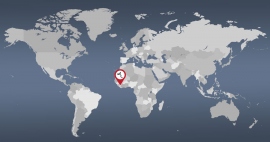UCSF Medical Center Statement on Ebola Virus Preparations
Although there are no confirmed or suspected cases of Ebola Virus Disease in California, today the University of California Office of the President informed the California Department of Public Health (CDPH) that all five UC Medical Centers, including UCSF, are positioned to provide care for Californians who have confirmed cases of Ebola, if necessary.
The state health administration said it will support the hospitals in meeting this public health need.
“As part of a public university, UC’s medical centers are far along in their preparation activities and are willing to care for confirmed Ebola patients,” said John Stobo, MD, UC senior vice president for health sciences and services. “Stepping up to a public health crisis is what these medical centers do, and in the past weeks we have been actively readying ourselves for any health eventuality related to Ebola.”

UCSF and the Ebola Response
Learn more about how UCSF is responding to the Ebola crisis.
UC Medical Centers Identified as Priority Hospitals to Treat Confirmed Ebola Cases
UC Newsroom
At UCSF, an isolation unit for treating patients is being constructed in one of the existing intensive care (ICU) units on the Mount Zion campus. The construction design and specifications were based on detailed information from the biocontainment units at Emory University and Nebraska Medical Center, two hospitals that have successfully treated patients with Ebola virus infection. The location of this unit is designed to allow for the proper facilities, equipment and resources, as well as infection control practices, to ensure patient and staff safety. A temporary isolation unit with the same specifications has already been set up in this ICU.
If UCSF receives a patient with suspected or confirmed Ebola virus infection, all other patients will be moved out of the ICU to other comparable locations at UCSF prior to the arrival of the Ebola patient.
Access to the isolation unit will then be tightly restricted and monitored by UCSF’s Environmental Health and Safety’s Emergency Response and Security Teams.
A team of UCSF nurses, clinical lab scientists, respiratory therapists and faculty physicians have volunteered to provide care for Ebola virus infected patients. These dedicated professionals have begun intensive training on the proper use of personal protective equipment (PPE). UCSF is using the most current Centers for Disease Control and Prevention (CDC) recommendations for the specific personal protective equipment and processes for placement and removal.
Enhanced training is also being provided to other UCSF sites where patients may arrive on their own seeking care, including UCSF Medical Center’s Emergency Department, Acute Care Clinics, and ambulatory clinics. ED staff have received extensive training in PPE and intake procedures and have participated in a practice drill. Training and drills have been scheduled for other ambulatory sites.
Care of these patients will be provided by a core designated group of volunteers and will not include, among others, trainee physicians, fellows, medical students, pharmacy students, pharmacy residents, or trainee nurses.
“As a public university, part of our mission is to provide medical leadership during a public health crisis,” said Josh Adler, MD, chief medical officer of UCSF Medical Center and UCSF Benioff Children’s Hospital San Francisco. “We plan to work closely with the California Secretary of Health and Human Services and the California Department of Public Health as well as other providers and facilities to maintain our preparedness.
“UCSF has put substantial effort into ensuring that we can provide the very highest quality and most compassionate care to patients with Ebola virus infection while safeguarding our staff, care providers, and all other patients.”
UCSF Medical Center launched preparations for an Ebola response in August by establishing a task force that includes key stakeholders from Infection Control, Nursing, Critical Care Medicine, Emergency Medicine, Lab Medicine, the Safety Office and the Department of Emergency Management.
Since then, UCSF leaders have worked closely with the CDC, California Department of Public Health, and the San Francisco Department of Public Health, and have consulted other institutions to gain knowledge of best practices, including Emory University and University of Nebraska.
UCSF Medical Center has established protocols for identifying patients who could arrive at the UCSF Medical Center Emergency Department and ambulatory care clinics.
For more information about the Ebola virus please visit the UCSF Ebola resource page and the U.S. Centers for Disease Control and Prevention website.
UCSF is the nation's leading university exclusively focused on health. Now celebrating the 150th anniversary of its founding as a medical college, UCSF is dedicated to transforming health worldwide through advanced biomedical research, graduate-level education in the life sciences and health professions, and excellence in patient care. It includes top-ranked graduate schools of dentistry, medicine, nursing and pharmacy; a graduate division with world-renowned programs in the biological sciences, a preeminent biomedical research enterprise and top-tier hospitals, UCSF Medical Center and UCSF Benioff Children's Hospitals.